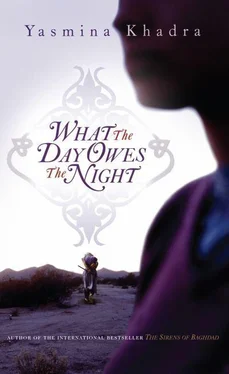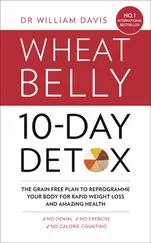As we walked farther, the hubbub died away and we wandered through peaceful, shady areas, the silence barely broken by a passing barouche or the clatter of a metal shutter. A few elderly European men with crimson faces lingered outside their front doors. They wore baggy shorts, shirts open to reveal their paunches, and broad-brimmed hats to protect their pale necks. Exhausted by the heat, they chatted over a glass of anisette set down on the pavement, distractedly waving fans to cool themselves. My father strode past without greeting them, without even looking at them, trying to act as though they were not even there, but his pace slackened now and lost something of its assurance.
We emerged on to a broad avenue where pedestrians stood window-shopping. My father stopped to watch a tram pass before crossing the road. He signalled to my mother, indicating a spot where she should wait for him, then, leaving her to look after the baskets and bundles, he ordered me to follow him to a chemist’s shop at the far end of a lane. He glanced through the front window first to make sure this was the right address, then straightened his turban, smoothed down his waistcoat and stepped inside. A tall, thin man behind the counter was scribbling in a ledger. He was wearing a three-piece suit and a red fez over his blonde hair. He had blue eyes and a delicate face; a narrow strip of moustache accentuated the thin-lipped slit that served him as a mouth. When he saw my father come in, he frowned, then he lifted a section at the side of the counter and stepped from behind it to greet us.
The two men threw their arms around each other. The embrace was brief but forceful.
‘Is this my nephew?’ asked the stranger, coming up to me.
‘Yes.’ My father nodded.
‘My God, he’s handsome!’
This man was my uncle. I was not aware that I had an uncle. My father had never spoken to us about his family. Or about anyone. He barely spoke to us at all.
My uncle crouched down and hugged me.
‘You have a fine young man there, Issa,’ he said.
My father said nothing. I saw his lips move and knew he was silently reciting verses from the Qur’an to ward off the evil eye.
The man got to his feet again and turned to my father. After a moment, he went back behind the counter but continued to stare at him.
‘You’re not an easy man to flush out, Issa. I have to assume that something serious has happened. It’s been years since you came to visit your big brother.’
My father did not beat about the bush. In a single, breathless sentence he recounted what had happened out in the bled, how our crops had gone up in flames, about the visit of the kaid . . . My uncle listened carefully and did not interrupt. I watched as his hands alternately gripped the counter and balled into fists. When my father had finished, he pushed his fez back and dabbed at his brow with a handkerchief. He was devastated, but he held up as best he could.
‘You should have asked me for money, Issa, instead of mortgaging our lands. You know what happens with that kind of loan. You’ve seen many people take the bait, and you’ve seen what has happened to them. How could you let yourself be swindled too?’
There was no reproach in my uncle’s tone, just an overwhelming disappointment.
‘What’s done is done,’ said my father, who could think of nothing else to say. ‘God has decided.’
‘The Lord did not command that your crops be burned . . . God cannot be blamed for the wickedness of man. Nor the Devil either.’
My father raised his hand to stop the conversation.
‘I’ve come to settle in the city,’ he said. ‘My wife and my daughter are waiting for me on the corner.’
‘Let’s go back to my house first. You can stay there for a few days and I will see what I can do—’
‘No.’ My father cut him off. ‘If a man is to get back on his feet, he must do it straight away. I need a home of my own, and I need it today.’
My uncle did not insist. He knew his brother’s stubbornness too well to contradict him. He took us to the far side of the city.
There is nothing cruder than the inequalities of a city. Walk around a block and day becomes night, life becomes death. Even now, years later, I still shudder whenever I remember that devastating experience.
The ‘suburb’ where we ended up broke the spell the city had cast only a few hours earlier. This was still Oran, but now we were behind the scenes, where the beautiful houses and the leafy avenues gave way to a sprawling chaos peppered with squalid shacks, disgusting shops, the tents nomads call kheimas, which are open to the four winds, and pens filled with livestock.
‘This is Jenane Jato,’ my uncle said. ‘Today is the day the souk, the market, is held. It’s usually quieter than this,’ he added, to reassure us.
Jenane Jato: a slum of scrubland and shacks teeming with squeaking carts, beggars, hawkers, donkey-drivers struggling with their beasts, water-carriers, charlatans and ragged children; a stifling clay-red wasteland of dust and filth that clung to the walls of the city like a malignant tumour. The abject poverty was unbelievable, and the people – piteous wretches – dissolved into the shadows. It was as though the damned had been driven out of hell without judgement or warning and washed up here; they were the personification of life’s futility.
My uncle introduced us to a puny little man with a short neck and shifty eyes. Bliss was a broker, a vulture waiting to grow rich on other people’s misery. At the time, with disease-ridden waves of migrants flooding into the city, such predators were unavoidable. Ours was no exception to the rule. Bliss knew that we were ruined, he knew we were at his mercy. I remember he had a goatee beard that made his chin seem abnormally long and wore a filthy fez perched on his huge, bald, misshapen head. I hated him the moment I set eyes on him, his snakelike smile, the way he rubbed his hands together as though about to eat us alive.
He greeted my father with a nod and listened as my uncle explained our situation.
‘I think I may have something for your brother, Doctor,’ said the broker, who seemed to know my uncle well. ‘If it’s something temporary you’re looking for, you won’t find anything better. It’s not a palace, but it’s comfortable and the neighbours are honest.’
He led us to a yard in front of what looked like a stable, near a stinking stream. He asked us to wait in the street, then cleared his throat loudly to let the women know to disappear – as was the custom if a man was about to walk into a room. When the coast was clear, he signalled for us to follow him.
The house was built around a central courtyard flanked by rooms each crammed with families fleeing the famine and the typhus that raged in the countryside.
‘Here it is,’ the broker said, pulling aside a curtain to reveal an empty room. It smelled of piss and cats, of dead chickens and vomit. The walls, still standing through some miracle, were black and oozed damp; the floor was covered in a carpet of rats’ droppings. ‘You won’t find a more affordable rent,’ he assured us.
My father stared at the cockroaches that teemed around a drain choked with filth, looked up at the cobwebs spotted with dead flies; the broker watched out of the corner of his eye, like a reptile eyeing its prey.
‘I’ll take it,’ my father said to the man’s relief.
Immediately he began to pile our belongings into a corner of the room.
‘The communal toilets are at the other end of the courtyard,’ the broker said enthusiastically. ‘There’s a well, too, though it’s dry right now. You’ll need to watch that the kids don’t get too close to the edge. We lost a little girl last year when some fool forgot to put back the cover. Apart from that, there’s nothing else you need to know. The neighbours are good people. They’ve all come in from the bled to work, and they never complain. If you need anything at all, come and ask me,’ he insisted eagerly. ‘I know people, I can lay my hands on anything, day or night, if you’ve got the money. If you didn’t already know, I rent out mats, blankets, oil lamps and paraffin stoves. You only have to ask. I’ll bring you the moon itself if you’ve got the money.’
Читать дальше












